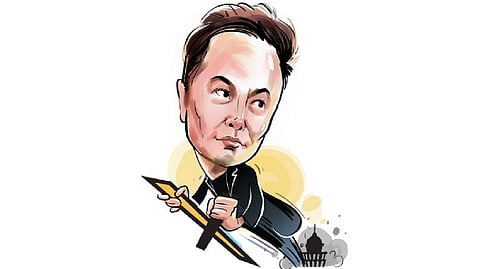

Elon Musk’s whirlwind stint in Washington has ended much the way it began: with disruption, controversy, and an unwavering refusal to play by the rules.
After just 129 days leading the Department of Government Efficiency (DOGE) — a Trump-era creation aimed at slashing federal spending and injecting private-sector dynamism into public institutions — Musk exits with a polarising legacy. It’s a record defined as much by lofty ambition as by uneven delivery.
From the outset, his appointment was a signal of disruption. As the world’s richest man and an icon of tech-driven transformation, Musk embodied the kind of outsider energy that President Donald Trump relishes. He arrived with a headline-grabbing pledge: cut $2 trillion from federal spending. Though that target was eventually scaled down, DOGE still claimed $175 billion in savings, an eye-catching figure, though experts continue to debate its validity. As with his ventures at Tesla and SpaceX, Musk’s goals were grand, his execution divisive.
Yet Musk did leave a mark. His influence was clearest in the aggressive downsizing of US foreign aid, most notably the gutting of USAID. Programmes focused on food security, gender equity, and global health was sharply curtailed or axed outright, raising alarms among humanitarian organisations. From stalled medical programmes in rural India to canceled scholarships for Afghan girls, the cuts drew intense criticism. In Musk’s calculus, it seemed, impact was measured in dollars saved, not lives affected.
His leadership style brought the same blend of entrepreneurial audacity and operational chaos familiar to followers of his corporate ventures. Mass layoffs, deep deregulation, and sweeping asset sales became DOGE’s modus operandi. At one point, a proposed cut of 250,000 federal jobs triggered panic across the civil service, though courts later reversed many of those firings. Even national security wasn’t spared until a proposed cut to the National Nuclear Security Administration prompted a very rare retreat.
True to form, Musk was unapologetically unorthodox. He admitted missteps, sometimes flippantly. He dismissed his errors with characteristic nonchalance. To some, his candour felt refreshingly honest. To others, it bordered on contempt for the consequences.
His ethos — move fast, break things, apologise later, if at all — was fundamentally at odds with the consensus-driven machinery of government. But under Trump, that was often a cherished feature, not a fatal flaw.
Ethical questions loomed throughout his tenure. As head of DOGE, Musk remained deeply entangled with his private companies. SpaceX continued winning lucrative federal contracts. Tesla, meanwhile, enjoyed enhanced visibility through federal initiatives. Starlink, his satellite internet firm, expanded aggressively into international markets, including India, prompting accusations of using public office for private gain. Musk denied wrongdoing. Trump dismissed ethical concerns. But the perception of impropriety persisted.
Musk’s time in Washington was also marked by internal friction. His impulsive management style alienated many inside the Trump administration — and caused an occasional strain with Trump — but never to the point of a rupture.
His dramatic condemnation of Trump’s own budget bill, calling it a betrayal of DOGE’s mission, exposed a fissure in the technocrat-populist alliance that had propelled him into government.
In the end, Musk left office much as he entered: on his terms, and perhaps with no intention of lingering in Washington’s slow-moving orbit. He achieved something symbolically relevant, infusing the federal bureaucracy with a startup-style urgency and an aggressive focus on cost-cutting. Whether that translates into lasting change is uncertain. But his impact is undeniable. And his influence in the Trump administration is here to stay.
Musk’s foray into government was a kind of moon-shot: a tech titan’s experiment in public service, where Silicon Valley’s velocity may have collided with bureaucratic inertia. For better or worse, the DOGE-era is likely over, at least in the most headline-grabbing way.
And Musk, as always, is already on to the next thing.